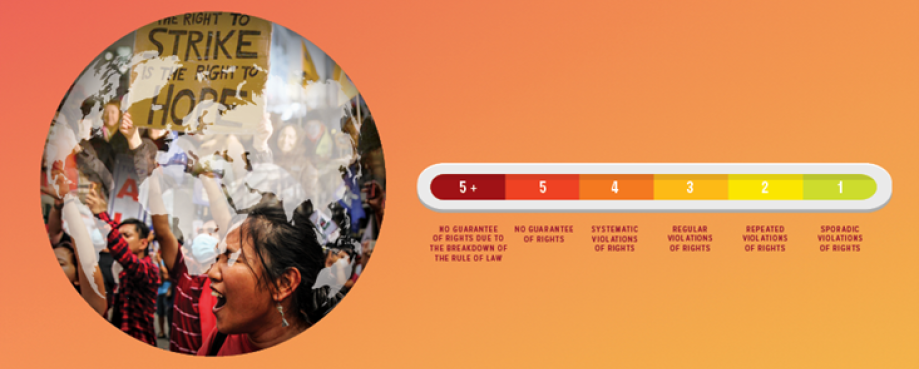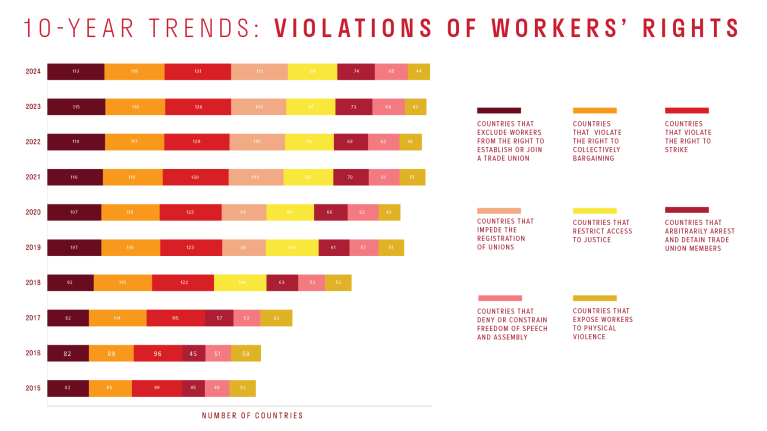
The ITUC Global Rights Index has tracked the rapid decline in workers’ rights in every region of the world over the past 11 years. This year’s report makes for difficult reading – a clear and urgent wake-up call that the democratic values and fundamental rights agreed by most countries at an international level are crumbling.
Workers are the beating heart of democracy, and their right to be heard is crucial to ensure the health and sustainability of democratic systems. When their rights are violated, democracy itself is attacked. Democracy and trade unions and workers’ rights go together; you cannot have one without the other.
That is why, with the release of the 2024 Index, in a year when four billion people are due to vote, the ITUC’s For Democracy campaign aims to defend and strengthen democracy in the workplace, in society and at the global level against right-wing, vested interests focused on eroding workers’ rights. This is our shared struggle.
The 2024 Global Rights Index
As a comprehensive review of workers’ rights in law ranking 151 countries against a list of 97 indicators derived from ILO Conventions and jurisprudence, the ITUC Global Rights Index is the only database of its kind. It rates countries on a scale from 1 to 5+ on the degree of respect for workers’ rights. Violations are recorded each year from April to March.
The 2024 Index found that:
- The 10 worst countries for working people are: Bangladesh, Belarus, Ecuador, Egypt, Eswatini, Guatemala, Myanmar, the Philippines, Tunisia and Türkiye.
- Twenty-two trade unionists were killed in six countries: Bangladesh, Colombia, Guatemala, Honduras, the Philippines, and the Republic of Korea.
- There are 12 countries where conditions are so bad, due to the breakdown of the rule of law, that they are rated 5+.
- Only two countries have improved ratings: Romania moved from 4 to 3 and Brazil is rated 4, an improvement on 5 last year.
- Thirteen countries have worse ratings: Costa Rica, Finland, Israel, Kyrgyzstan, Madagascar, Mexico, Nigeria, Qatar, Russian Federation, Saudi Arabia, Sudan, Switzerland and Venezuela.
- Europe has an average rating of 2.73, down from 2.56 in 2023, continuing a rapid deterioration from 1.84 in 2014 – the biggest decline of any region in the world.
- The worst region in the world for working people is the Middle East and North Africa, with an average rating of 4.74, worse than 4.53 in 2023, and 4.25 in 2014. All countries in the region violated the rights to collective bargaining, to join a trade union and to register a trade union.
Globally, record high levels of violations include:
- 87% of countries violated the right to strike.
- 79% of countries violated the right to collective bargaining.
- In dozens of countries, free speech and assembly was restricted, and workers were arrested or faced violence for demanding their basic rights.
The 2024 ITUC Global Rights Index also tells the story of courageous workers and trade unionists who face grave dangers to improve the lives of their colleagues and defend democratic rights. Despite a few modest improvements, the general picture shows a relentless attack on civil liberties, workers’ rights and the interests of working people.
Europe: leading the race to the bottom
It is worth looking more closely at the situation in Europe. It has often been held up as a positive case for the rest of the world to follow for workers’ rights, but that is no longer the case. The European social model is crumbling rapidly as we witness a concerted attack on both workers’ rights and the trade union movement. This amounts to a democratic crisis for the region because trade unions, workers’ rights and democracy are intricately linked.
The steep decline of Europe’s rating since 2014 indicates that the “worker-centric” social model is no longer a reality for millions of workers in the region, as is the case for most working people across the world. We are witnessing an accelerating global race to the bottom for workers’ rights.
This international trend comes against the backdrop of a devastating cost-of-living crisis that shows no sign of letting up, technological disruption rapidly changing the world of work, and worsening global levels of violent conflict where working people face the catastrophic consequences of war.
For Democracy
The only way that these trends can be addressed, sustainably, is through a truly democratic movement. A movement that crosses borders and sectors, ages and genders, races and religions and has the power, presence and accountability to change the balance of power in every workplace, country and global institution. Trade unions are that movement. We must take up our role as the foremost practitioners and defenders of, and fighters for, the democratic values we exercise every day.
That is why the ITUC For Democracy campaign starts at the workplace, with respect for trade union rights in every part of the world. This will lead to greater democracy and social justice across society and at the global level. As we mobilise our collective strength in defence of democracy, we can play our part in creating a fairer and safer world for all.

